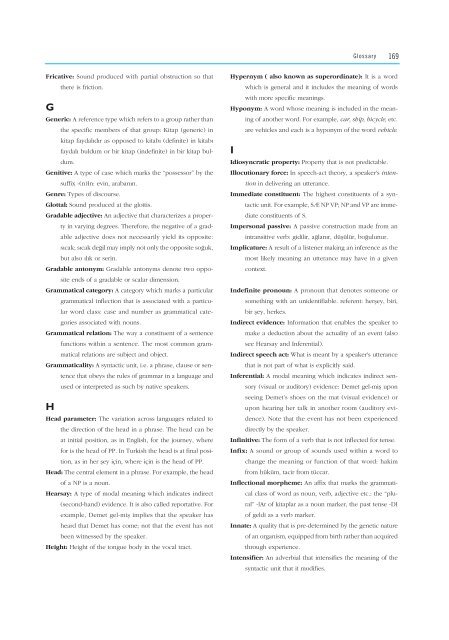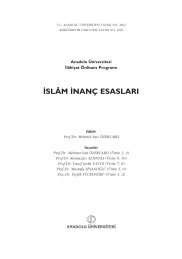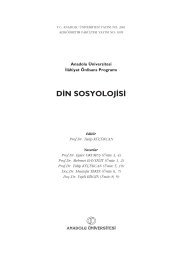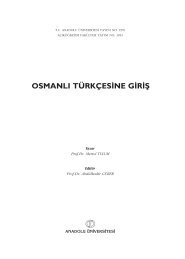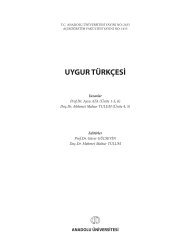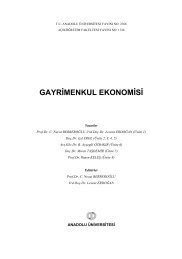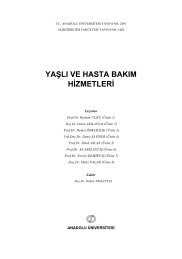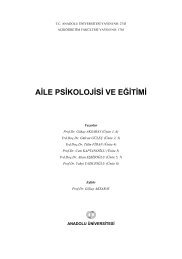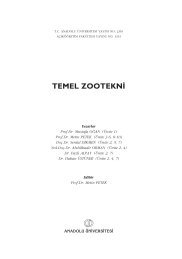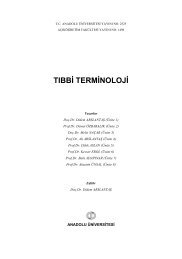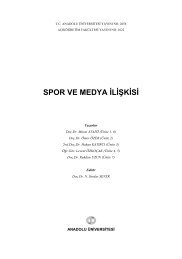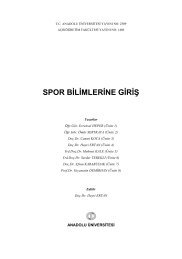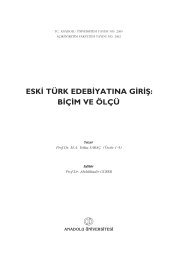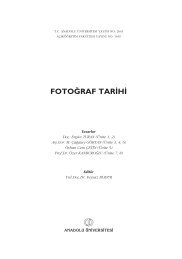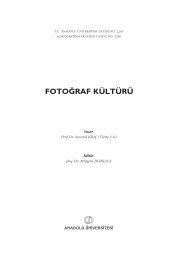turkish phonology and morphology (türkçe ses ve b‹ç‹mb‹lg‹s‹)
turkish phonology and morphology (türkçe ses ve b‹ç‹mb‹lg‹s‹)
turkish phonology and morphology (türkçe ses ve b‹ç‹mb‹lg‹s‹)
You also want an ePaper? Increase the reach of your titles
YUMPU automatically turns print PDFs into web optimized ePapers that Google loves.
Fricati<strong>ve</strong>: Sound produced with partial obstruction so that<br />
G<br />
there is friction.<br />
Generic: A reference type which refers to a group rather than<br />
the specific members of that group: Kitap (generic) in<br />
kitap faydal›d›r as opposed to kitab› (definite) in kitab›<br />
faydal› buldum or bir kitap (indefinite) in bir kitap buldum.<br />
Geniti<strong>ve</strong>: A type of case which marks the “pos<strong>ses</strong>sor” by the<br />
suffix -(n)In: evin, araban›n.<br />
Genre: Types of discourse.<br />
Glottal: Sound produced at the glottis.<br />
Gradable adjecti<strong>ve</strong>: An adjecti<strong>ve</strong> that characterizes a property<br />
in varying degrees. Therefore, the negati<strong>ve</strong> of a gradable<br />
adjecti<strong>ve</strong> does not necessarily yield its opposite:<br />
s›cak; s›cak de¤il may imply not only the opposite so¤uk,<br />
but also ›l›k or serin.<br />
Gradable antonym: Gradable antonyms denote two opposite<br />
ends of a gradable or scalar dimension.<br />
Grammatical category: A category which marks a particular<br />
grammatical inflection that is associated with a particular<br />
word class: case <strong>and</strong> number as grammatical categories<br />
associated with nouns.<br />
Grammatical relation: The way a constituent of a sentence<br />
functions within a sentence. The most common grammatical<br />
relations are subject <strong>and</strong> object.<br />
Grammaticality: A syntactic unit, i.e. a phrase, clause or sentence<br />
that obeys the rules of grammar in a language <strong>and</strong><br />
used or interpreted as such by nati<strong>ve</strong> speakers.<br />
H<br />
Head parameter: The variation across languages related to<br />
the direction of the head in a phrase. The head can be<br />
at initial position, as in English, for the journey, where<br />
for is the head of PP. In Turkish the head is at final position,<br />
as in her fley için, where için is the head of PP.<br />
Head: The central element in a phrase. For example, the head<br />
of a NP is a noun.<br />
Hearsay: A type of modal meaning which indicates indirect<br />
(second-h<strong>and</strong>) evidence. It is also called reportati<strong>ve</strong>. For<br />
example, Demet gel-mifl implies that the speaker has<br />
heard that Demet has come; not that the e<strong>ve</strong>nt has not<br />
been witnessed by the speaker.<br />
Height: Height of the tongue body in the vocal tract.<br />
Glossary<br />
169<br />
Hypernym ( also known as superordinate): It is a word<br />
which is general <strong>and</strong> it includes the meaning of words<br />
with more specific meanings.<br />
Hyponym: A word whose meaning is included in the meaning<br />
of another word. For example, car, ship, bicycle, etc.<br />
are <strong>ve</strong>hicles <strong>and</strong> each is a hyponym of the word <strong>ve</strong>hicle.<br />
I<br />
Idiosyncratic property: Property that is not predictable.<br />
Illocutionary force: In speech-act theory, a speaker's intention<br />
in deli<strong>ve</strong>ring an utterance.<br />
Immediate constituent: The highest constituents of a syntactic<br />
unit. For example, SÆ NP VP; NP <strong>and</strong> VP are immediate<br />
constituents of S.<br />
Impersonal passi<strong>ve</strong>: A passi<strong>ve</strong> construction made from an<br />
intransiti<strong>ve</strong> <strong>ve</strong>rb: gidilir, a¤lan›r, düflülür, bo¤ulunur.<br />
Implicature: A result of a listener making an inference as the<br />
most likely meaning an utterance may ha<strong>ve</strong> in a gi<strong>ve</strong>n<br />
context.<br />
Indefinite pronoun: A pronoun that denotes someone or<br />
something with an unidentifiable. referent: herfley, biri,<br />
bir fley, herkes.<br />
Indirect evidence: Information that enables the speaker to<br />
make a deduction about the actuality of an e<strong>ve</strong>nt (also<br />
see Hearsay <strong>and</strong> Inferential).<br />
Indirect speech act: What is meant by a speaker's utterance<br />
that is not part of what is explicitly said.<br />
Inferential: A modal meaning which indicates indirect sensory<br />
(visual or auditory) evidence: Demet gel-mifl upon<br />
seeing Demet’s shoes on the mat (visual evidence) or<br />
upon hearing her talk in another room (auditory evidence).<br />
Note that the e<strong>ve</strong>nt has not been experienced<br />
directly by the speaker.<br />
Infiniti<strong>ve</strong>: The form of a <strong>ve</strong>rb that is not inflected for tense.<br />
Infix: A sound or group of sounds used within a word to<br />
change the meaning or function of that word: hakim<br />
from hüküm, tacir from tüccar.<br />
Inflectional morpheme: An affix that marks the grammatical<br />
class of word as noun, <strong>ve</strong>rb, adjecti<strong>ve</strong> etc.: the “plural”<br />
-lAr of kitaplar as a noun marker, the past tense -DI<br />
of geldi as a <strong>ve</strong>rb marker.<br />
Innate: A quality that is pre-determined by the genetic nature<br />
of an organism, equipped from birth rather than acquired<br />
through experience.<br />
Intensifier: An ad<strong>ve</strong>rbial that intensifies the meaning of the<br />
syntactic unit that it modifies.


